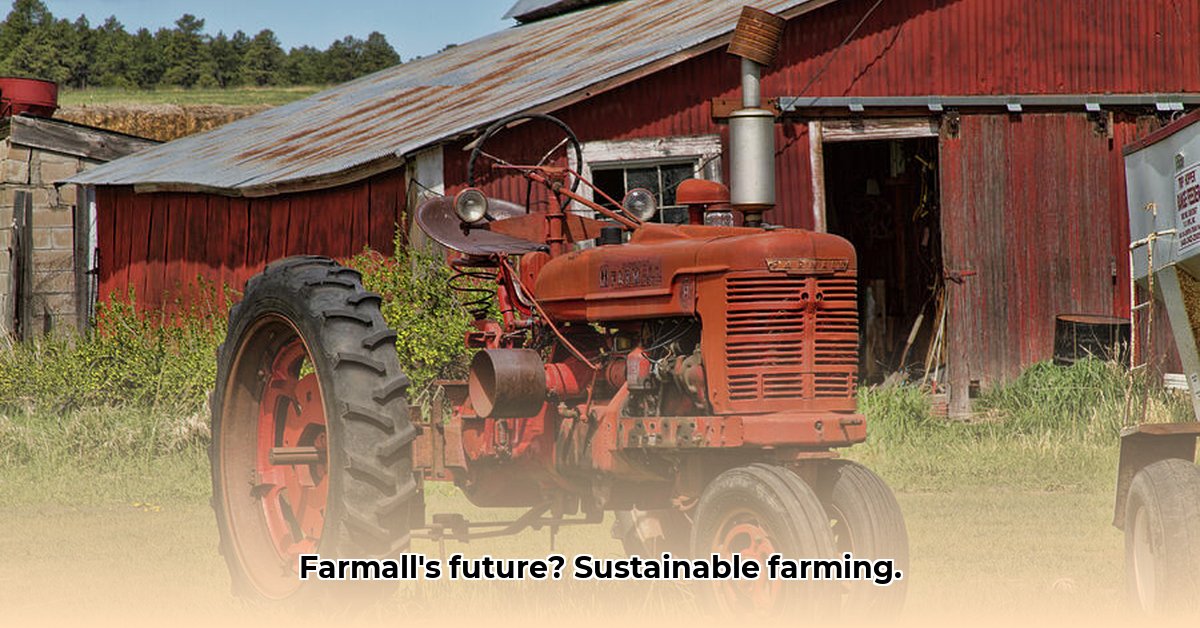
Old Farmall Tractor: Legacy Meets Sustainability
The Farmall tractor, a name synonymous with agricultural mechanization, holds a revered place in farming history. Its robust design revolutionized cultivation, significantly boosting efficiency. But can this iconic brand adapt to the demands of modern sustainable agriculture? The resurgence of Farmall tractors by CNH Global prompts critical examination of its commitment to environmental responsibility. Are these updated machines truly contributing to a greener future? For more on electric options, see electric tractors.
A Legacy Forged in Steel, Refined for Sustainability
The Farmall's narrative transcends mere machinery; it’s a story of agricultural transformation. Original Farmall models, with their streamlined design and powerful engines, drastically improved farming productivity. This legacy of innovation and dependability forms the foundation upon which CNH Global aims to build. However, contemporary agricultural challenges differ markedly from those of previous eras. Sustainability is no longer optional; it's paramount.
Examining the Modern Farmall: A Closer Look
CNH Global offers a range of utility tractors under the Farmall banner, featuring modern technology and enhanced capabilities. However, assessing their true sustainability requires a comprehensive analysis. Currently, readily available data on fuel efficiency, emissions, and lifecycle assessments (LCAs) are limited. This lack of transparency hinders definitive judgments and detailed comparisons to competitor brands.
Sustainability Assessment: A Holistic Approach
Sustainable agriculture encompasses the entire machine lifecycle—from material sourcing to disposal. Key questions remain: Do modern Farmalls utilize sustainably-sourced materials? Are they designed for easy repair and extended lifespan? Are components easily recycled? These factors are crucial for evaluating their full environmental impact and require comprehensive LCA data, currently lacking in public availability.
Market Analysis: Competition and the Drive for Change
The Farmall brand enjoys significant recognition, representing reliability and heritage. This brand equity is a valuable asset. Yet, the agricultural machinery market is highly competitive. To appeal to environmentally conscious farmers, Farmall must offer compelling features beyond its legacy. This includes precision farming technologies, fuel-efficient engine designs, and transparent sustainable manufacturing practices. CNH Global must convince farmers that modern Farmalls represent a responsible investment, supporting their long-term sustainability goals and navigating stringent environmental regulations.
Challenges and Opportunities: Innovation and Collaboration
The potential for Farmall tractors is substantial. A future of near-zero emissions, unparalleled fuel efficiency, and optimized precision agriculture is within reach. Realizing this vision mandates investment in research and development, pushing technological boundaries. Collaborative efforts between CNH Global, agricultural universities, and research institutions are crucial for accelerating advancements. The Farmall brand's future hinges on embracing this collaborative innovation.
Transparency: A Call for Open Data
A major obstacle to understanding Farmall's sustainability is the lack of publicly available data. CNH Global should enhance transparency by releasing detailed information on fuel consumption, emissions profiles, and complete LCAs. This data should be independently verified to foster consumer trust and facilitate objective comparisons with competitor brands.
The Road Ahead: A Legacy Redefined
The original Farmall symbolized innovation. Whether modern Farmalls achieve comparable status in the context of sustainable agriculture remains to be seen. CNH Global’s commitment to environmental responsibility is paramount. Increased transparency, readily accessible data, and a focus on innovation are essential for success. The Farmall’s future depends on demonstrating that its legacy extends beyond efficiency - it's about building a sustainable agricultural future.
Comparative Analysis: A Framework for Future Research
| Feature | Farmall Model X | Competitor A | Competitor B |
|---|---|---|---|
| Fuel Efficiency (l/ha) | Data Needed | Data Needed | Data Needed |
| Greenhouse Gas Emissions (g/kWh) | Data Needed | Data Needed | Data Needed |
| Lifecycle Assessment Score | Data Needed | Data Needed | Data Needed |
| Cost of Ownership | Data Needed | Data Needed | Data Needed |
(Note: This table highlights the data needed for thorough comparison. Currently, sufficient data is unavailable.)
Three Pivotal Points:
- The legacy of the Farmall brand presents a significant marketing advantage, but requires a demonstrable commitment to sustainability.
- A lack of publicly available data on fuel efficiency, emissions, and lifecycle assessments hinders a complete evaluation of the modern Farmall's environmental impact.
- Increased transparency and collaboration are critical for the success of the Farmall brand in the evolving landscape of sustainable agriculture.